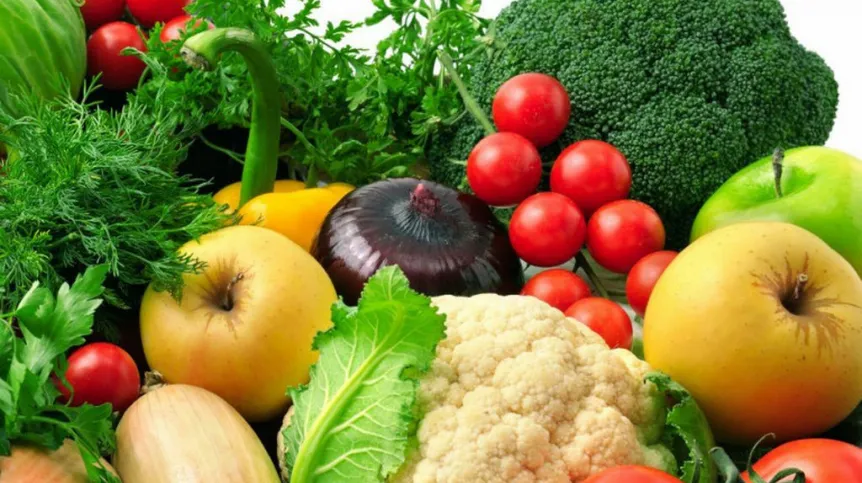
In recent years in Poland, the consumption of vegetables and fruits, on which our health largely depends, ceased to grow and begins to drop - alarmed experts during the conference at the Institute of Food and Nutrition in Warsaw.
"When it comes to teaching healthy eating habits, after a period of success, we still have a lot to do in our country" - said the director of the Institute of Food and Nutrition, Prof. Mirosław Jarosz. He added that the we eat too little fruits and vegetables, and we do not eat them often enough. We do, however, consume too much salt, animal fats and sugars.
According to CSO data presented at the conference, in the period of 2002-2012 the consumption of fruit in Poland decreased from 4 to 3.4 kg per month, and vegetables including potatoes from 13 to 9 kg. The consumption of vegetables not including potatoes fell from 5.5 to 5 kg.
Nutritionist from the Jagiellonian University Medical College, Dr. Agnieszka Kozioł-Kozakowska said that Poles eat a lot of potatoes, which are generally not included as vegetables in the statistics, like other bulbs containing starches, for example cassava.
Recognized as fully valuable, however, are fruit juices with no added sugar, nutritional value of which is similar to fresh fruit. However, their consumption also decreases. According to the Central Statistical Office, in 2006 average Pole consumed 1, 1 litres of fruit juice per month, in 2013 only 0.86 litres.
Annually, each of us consumes an average of 10.3 litres of fruit juices, which is less than 30 ml per day. For comparison, Finns and Norwegians drink almost three times more juice - about 30 litres.
Comparison of the consumption of vegetables and fruits looks equally bad. According to the data presented at the conference, the daily intake of fresh fruits and vegetables (excluding potatoes and juice) in Poland is slightly higher than 250 g, while the average in Europe is over 600 g. Even after factoring in potatoes and fruit and vegetable products, the consumption of vegetables and fruits in Poland barely reaches 440 grams per day.
"We are worried because science has strong evidence that vegetables and fruits in the amount of at least 400 g per day significantly reduce the risk of cardiovascular disease and cancer, as well as many other diseases, particularly hypertension and diabetes" - said Prof. Mirosław Jarosz.
According to Prof. Longina Kłosiewicz-Latoszek from the Institute of Food and Nutrition, there is much evidence that eating fruits and vegetables protects against cardiovascular diseases, especially hypertension, heart attacks and strokes. There are many studies suggesting that such diet will reduce the risk of developing cancer, such as cancer of the stomach, pancreas, colon and oesophagus.
"Wrong diet and obesity and overweight increase the risk of cancer between 30 and 70 percent depending on particular type" - said Prof. Jarosz. Improper diet is mostly too low fruit and vegetable intake and high consumption of saturated (animal) fats and monosaccharides.
According to the specialist, vegetables and fruits should be consumed in the largest possible quantities and as often as possible during the day, preferably in every meal. "Recent reports have shown that consumption of 1 to 3 portions of these products reduces the risk of cancer, heart attack and stroke by 14 percent. 5 to 7 portions of vegetables and fruit reduce it by 36 percent, and more than 7 portions - by about 42 percent" - she added.
One portion is products weighing 80-100 g; it can be a medium-sized apple, banana, large tangerine, 7 strawberries or 5 plums. "One portion of fruit and vegetables is not a ham sandwich with only a slice of cucumber and tomato" - emphasised Dr. Kozioł-Kozakowska.
Prof. Jarosz explained that fruit and vegetable intake often helps maintain high and constant level of health beneficial substances in the body and blood, primarily including antioxidants, and proper pH.
The study conducted over more than eight years and in eight European countries shows that each serving of vegetables and fruit weighing 80 g, reduces the risk of death due to cardiovascular disease by about 4 percent. Eight such servings per day reduces the risk by 22 percent - said Prof. Kłosiewicz-Latoszek.
According to the European Code Against Cancer, up to 62 percent Poles do not eat fruits and vegetables every day. Only 2 percent Poles eat fruits and vegetables every day, and in accordance with the recommendations, in the amount of at least 400 grams per day.
PAP - Science and Scholarship in Poland, Zbigniew Wojtasiński
zbw/ mki/ mrt/
tr. RL













